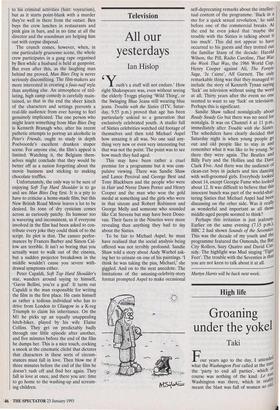Television
All our
yesterdays
Ian Hislop
Youth's a stuff will not endure.' How right Shakespeare was, even without seeing the elderly Troggs playing 'Wild Thing', or the Swinging Blue Jeans still wearing blue jeans. Trouble with the Sixties (ITV, Satur- day, 9.55 p.m.) proved that age has been particularly unkind to a generation that exclusively celebrated youth. A studio full of Sixties celebrities watched old footage of themselves and then told Michael Aspel how amazing it all was. No one said any- thing very new or even very interesting but that was not the point. The point was to see how much they had aged.
This may have been rather a cruel premise for a programme but it was com- pulsive viewing. There was Sandie Shaw and Lance Percival and George Best and Tony Blackburn and the people who were in Hair and Nyree Dawn Porter and Henry Cooper and the man who won the gold medal at something and the girls who were in that sitcom and Robert Robinson and George Melly and someone who sounded like Cat Stevens but may have been Dono- van. Their faces in the Nineties were more revealing than anything they had to gay about the Sixties.
To be fair to Michael Aspel, he must have realised that the social analysis being offered was not terribly profound. Sandie Shaw told a story about Andy Warhol ask- ing her to urinate on one of his paintings. 'I think he was taking the piss, Michael,' she giggled. And on to the next anecdote. The limitations of the amusing-celebrity-story format prompted Aspel to make occasional self-deprecating remarks about the intellec- tual content of the programme. 'Back in a mo for a quick sexual revolution,' he said before one of the commercial breaks. At the end he even joked that 'maybe the trouble with the Sixties is talking about it too much'. This did not appear to have occurred to his guests and they trotted out the familiar litany of the decade: Harold Wilson, the Pill, Radio Caroline, That Was the Week That Was, the 1966 World cup, Henry Cooper against Ali, The Forsyte Saga, `Je t'aime', Alf Garnett. The only remarkable thing was that they managed to include the story of Kenneth Tynan saying 'fuck' on television without using the word at all. Thirty years after the event no one seemed to want to say 'fuck' on television. Perhaps this is significant. Sandie Shaw talked nostalgically about Ready Steady Go but there was no need for nostalgia. It was on Channel 4 at 11 p.m., immediately after Trouble with the Sixties. The schedulers have clearly decided that Saturday night is when young people go out and old people like to stay in and remember what it was like to be young. So there they were again. The Beatles and Billy Fury and the Hollies and the Dave Clark Five. And there was the audience of clean-cut boys in jackets and ties dancing with well-groomed girls. Everybody looked about 14, except Georgie Fame who looked about 12. It was difficult to believe that this innocent bunch was part of the world-she' tering Sixties that Michael Aspel had been discussing on the other side. Was it really as wonderful and important as all those middle-aged people seemed to think?
Perhaps this irritation is just jealousY- Earlier on the same evening (7.15 pin.), BBC 2 had shown Sounds of the Seventies. This was the decade of my youth and the programme featured the Osmonds, the Bay City Rollers, Suzy Quatro and David Cas- sidy. The highlight was Mud singing 'Tiger Feet'. The trouble with the Seventies is that you are not keen to talk about it at all.
Marlyn Harris will be back next week


























































 Previous page
Previous page